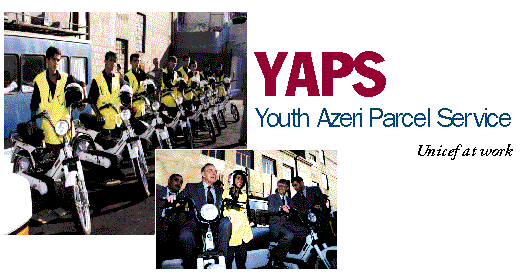|
Autumn 1997 (5.3)  Sixteen-year-old Shamil Mammadov has no home or family support since he lost his parents when he was nine-years-old and was brought up in Baku Orphanage No. 2. Having simply graduated from secondary school, his best opportunity for work was only that of a cook, particularly in this dubious period of his country's transition. His hope of having a home some day seemed to be a far-fetched dream. But recently Shamil, along with eight other youths, received a full-time and well-paid job of couriers with YAPS. Now, Shamil's dreams can come true. YAPS is a new motorbike courier service that aims to provide the business community with an efficient and professional mail and parcel delivery service. It is the first motorcycle pickup courier service of its kind in Baku and the first attempt to integrate young people without traditional family support and those who are handicapped into mainstream society. Couriers are instructed in driving, English, computer skills and in running a customer-focused business. YAPS promises prompt and safe door-to-door delivery. YAPS is expected to become self-sufficient and provide funding for CH Child Help Line (CHL) Both the YAPS and the CHL projects were masterminded by Roberto Laurenti and his team at UNICEF. The Dutch government made the initial donation of $150,000 to get the projects started. The programs are also sponsored by Azerbaijan International Operating Company (AIOC) and Shell. Contributions were made by BP and Statoil Alliance, Mobil, Ramco, Pennzoil, Wicklow Group, British Bank and Morrison Construction. Both programs began in July of 1997. Contact: YAPS: (994-12) 97-77-00. CHL: 97-33-33. Ambassador's Wife Honored The ceremony took place in Washington, D.C. on June 26, 1997, at the State Department. Former President George Bush was honored with the "Lifetime Contributions to American Diplomacy" award at the same event. Mrs. Kauzlarich is known for her contributions in Azerbaijan by everyone from refugees, musicians, students as well as among academic, government and diplomatic circles. It was President Aliyev who once remarked (perhaps, only half in jest) that "Anne Khanum (Mrs. Anne) is more valuable to the United States than any ambassador." When Mrs. Kauzlarich heard in 1995 that the National Ballet Company would probably not be able to perform because of lack of ballet shoes, she initiated a movement to start an organization which became known as the "Friends of Azerbaijani Culture" (Azerbaijan Madaniyyatinin Dostlari) In two years, this group raised over $60,000 and not only purchased ballet shoes, but also bought instruments for Azeri musicians and refugee children, funded musical scholarships, arranged Master classes and concerts and sponsored a book on Azerbaijani carpets. One thing that distinguished Mrs. Kauzlarich during her stay in Baku was how hard she worked to learn the Azeri language. Eventually, she came to speak with considerable fluency and was deeply respected by the Azerbaijanis for her efforts. She was tireless in her visits to schools, orphanages and refugee camps. Together with the wife of the British Ambassador, Elizabeth Young, she founded the International Women's Club, which organizes assistance for orphans through the country. Mrs. Kauzlarich's cultural activities went a long way to assuage tension that resulted when the U.S. Congress passed unfair legislature (Section 907 of the Freedom Support Act) banning all U.S. aid to the Azerbaijani government. This law from 1992 is still in effect. The Kauzlarich completed their
three-year tour in Azerbaijan this summer. Richard Kauzlarich
has since been reassigned as Ambassador to Bosnia and they have
moved to Sarajevo. |
